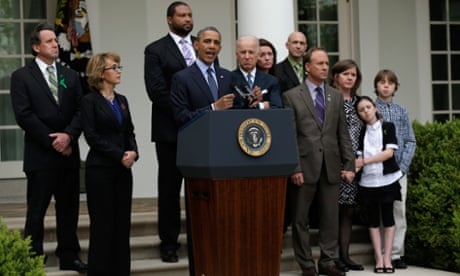On Wednesday, the United States Senate defeated the Manchin-Toomey proposal on background checks. The defeat was a setback for gun control advocates, though it should not have come as a surprise. The defeat with a manifestation of growing problem for Democrats: their coalition is bad for winning many seats in the Senate, so it's bad for passing legislation, too.
Each state, regardless of size, gets two senators. The least populous state, Wyoming, at 576,000 residents, has two senators, as does the most populous state, California, at 38 million. These less populated states tend be mostly rural. The more populated states like California gain their population because of large cities.
The issue is that Democratic voters tend to congregate in larger cities. Per the 2012 exit polls, President Obama won cities with populations over 500,000 (or cities with populations about the size of all of Wyoming) by 40pt. They won cities with a population of between 50,000-500,000 by a still impressive 18pt. They lost the suburbs by 2pt, cities with populations between 10,000 and 50,000 by 14pt, and rural areas by an astounding 24pt.
Indeed, look at a key part of the Democratic coalition: Latinos. Forty-five percent of Latinos live in the ten largest metropolitan areas. Obama won 12 out of the 16 top states with the largest Latino population. Latinos have helped to solidify the Democratic hold on what was once the swing state of California with 38% of the state's population – far greater than the national average of 16.3%. Forty-one states, however, have a Latino population at a lower proportion than the nation's 16.3%; 33 have a population that is less than 10% Latino.
So, how did this manifest itself on the state level?
President Obama won a 7.3pt victory in 2008, yet only carried 28 states. Four years prior, President Bush won only a 2.5pt victory and carried 31 states. Eight years prior to that, in 1996, President Clinton won by 8.5pt and took 31 states. George HW Bush emerged victorious by 7.7pt and won 40 states. That's right: GHW Bush's national margin was about the same as Obama's was 20 years later, but he took 12 more states.
Democrats have tended to win fewer states than Republicans given the same national vote victory, but it's become worse. To win 30 states in the 2012 election, Obama would have needed to carry the national vote by about 9pt more than he did. He lost Arizona by 9pt, even as he won nationally by 3.9pt. It would have taken a true landslide for Obama to have won by 13pt nationally.
Twenty years ago, this concentration of Democratic strength might not have been too big of a deal, in terms of Senate representation. As I noted back in December, 49% of the Democrat's 1993 senate caucus came from states that were more Republican the nation as a whole in the prior presidential election. Today, that percentage has been cut in half to only 25%.
When you combine the fact that Democratic presidential nominees are winning fewer states with the fact that there is more straight ticket-voting, the Democrats have a major problem on their hands. It's simply going to get harder here on in to win a Senate majority, let alone a super-majority of 60 seats, which a party really needs to overcome the growing use of the filibuster.
The Democrats who are in "red" states recognize this fact and you saw it this week in the gun ownership background checks amendment vote. The four Democrats who bucked their party line were from states more Republican than the nation as a whole in the last presidential election. Three of the four are up for re-election in 2014. Of the red state Democrats running for re-election in 2014, three of five voted against the Manchin-Toomey compromise.
Just as bad for Democratic legislation is that there are no Republicans out there willing to compromise. Only 16% of the Republican Senate caucus comes from states where Obama won by a greater percentage than he won nationally. The percentage of blue state Republicans is also down by about half from the 28% it stood at after the 1992 elections. The Republicans who are elected now come from red states and just have no electoral need to compromise. If anything, they're more fearful of a primary challenge from a stricter conservative.
Only one Republican from a red state, John McCain, voted for Manchin-Toomey. The other three were all from states that were more Democratic than the nation as a whole. The bill's co-sponsor Pat Toomey, who is no liberal, likely benefitted from the politics of being on board with a bill that is popular in his home state of Pennsylvania.
None of this means that Democrats won't get back to 60 seats, or can't bring Republicans on board, in the future. It just means that it's just much harder than it used to be and will get harder still. The current Democratic coalition is concentrated in a few states, which has resulted in fewer states being Democratic on the national level. Combine this with less split-ticket voting between presidential and congressional races, and it's bad news for Democrats in getting proposals through the Senate.
The immediate result was the failure of Manchin-Toomey – an event that I expect to be repeated with much future Democratic legislation.
